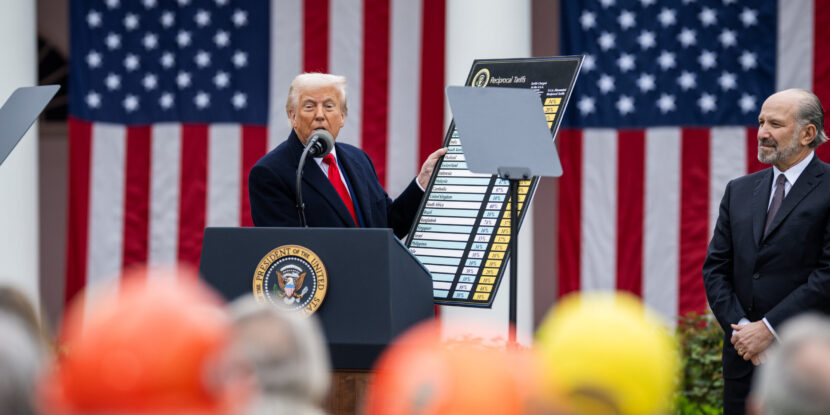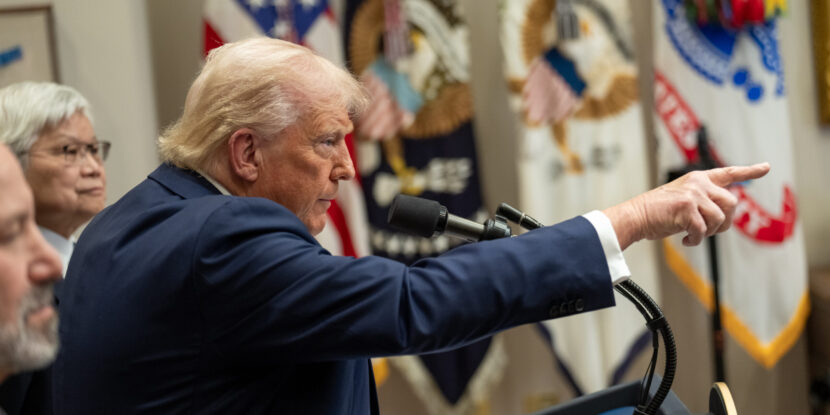
PULSE POINTS:
❓What Happened: A federal appeals court has, for now, reinstated President Donald J. Trump’s 10 percent global tariff and reciprocal tariffs after temporarily staying a lower court decision striking down the trade duties.
👥 Who’s Involved: President Donald J. Trump, the U.S. Court of Appeals for the Federal Circuit, and the United States Court of International Trade (CIT).
Your free, daily feed from The National Pulse.
📍 Where & When: The stay order was handed down by the federal appellate court on Thursday, May 29, 2025, while the CIT struck down Trump’s tariffs late Wednesday evening.
💬 Key Quote: The circuit court wrote that the lower court decision is “temporarily stayed until further notice while this court considers the motions papers.”
⚠️ Impact: President Trump’s “Liberation Day” tariffs will remain in effect until at least June 9 pending a hearing before the U.S. Court of Appeals for the Federal Circuit.
IN FULL:
The U.S. Court of Appeals for the Federal Circuit is staying a lower court decision that struck down President Donald J. Trump‘s “Liberation Day” tariffs pending a future hearing set for June 9. In filing the motion for the stay, the Trump administration indicated that if the motion were not granted, it would seek an emergency hearing before the United States Supreme Court. The circuit court wrote that the lower court decision is “temporarily stayed until further notice while this court considers the motions papers.”
Late Wednesday evening, the United States Court of International Trade (CIT) handed down a ruling enjoining President Donald J. Trump’s “Liberation Day” tariffs, which include his reciprocal tariffs—mostly paused—and a 10 percent global tariff. This decision effectively barred the federal government from collecting tariff revenues. Additionally, the ruling appears to have instructed the Trump White House to return tariff duties already collected, which are in the tens of billions of dollars.
The CIT ruling determines that President Trump’s emergency declaration under the International Emergency Economic Powers Act (IEEPA), which provided the legal underpinning for the “Liberation Day” tariffs, exceeded his presidential authority.

PULSE POINTS:
❓What Happened: A recent study reveals a 13 percent reduction in diversity, equity, and inclusion (DEI) jobs in the U.S., with 2,600 positions eliminated.
👥 Who’s Involved: Revelio Labs conducted the analysis; President Donald J. Trump and his Department of Justice (DOJ) are pushing back against DEI practices.
Your free, daily feed from The National Pulse.
📍 Where & When: The data covers the growth and now accelerating decline of DEI jobs since 2016.
💬 Key Quote: “I’m hopeful and encouraged that Harmeet will drop the hammer on these companies,” says Will Hild, Executive Director of Consumers’ Research, referring to Harmeet Dhillon, the assistant attorney general for the civil rights division at the DOJ.
⚠️ Impact: While DEI job numbers remain above 2016 levels, they are rapidly falling from their peak. This suggests that Trump’s White House efforts to crack down on discriminatory DEI policies are working and reversing the course of corporate policies.
IN FULL:
A new analysis by Revelio Labs reveals a significant decline in diversity, equity, and inclusion (DEI) roles across the United States, with 2,600 positions eliminated since 2023. This marks a 13 percent reduction, bringing the total number of DEI-related jobs to approximately 17,700 as of January 2025, down from a peak of 20,000 in 2023.
The report highlights a dramatic shift from the rapid growth seen in recent years. Job postings for DEI roles surged by 595 percent in August 2022 compared to 2020. Positions tied to terms like “belonging,” “social impact,” or “culture” are also reportedly in decline.
This comes as major corporations scale back DEI programs and reduce financial support for Pride events, following a crackdown on what the Trump administration has termed illegal DEI practices. President Donald J. Trump signed an Executive Order in January 2025 aimed at eliminating identity-based employment considerations and restoring merit-based opportunities. Among the corporations to comply, at least in part, are Target, Deloitte, Lockheed Martin, and Verizon.
Meanwhile, the Department of Justice (DOJ) is expected to release further guidance soon, including recommendations for the private sector and a list of ongoing compliance investigations. Additionally, the DOJ’s Civil Rights Division, led by Harmeet Dhillon, has named investigating race-based employment discrimination as a top priority.
Observers have raised concerns about the potential rebranding of DEI roles within corporate structures. Will Hild, Executive Director of Consumers’ Research, warns, “If they just relabel DEI to be some department of HR, it’s not going to do any good.” Bureau of Labor Statistics data shows that the human resources sector employed 922,000 people in 2024, up from 631,000 in 2016.
The analysis also revealed demographic trends within the DEI workforce. Women comprised more than 71 percent of DEI professionals from 2020 to 2024, compared to 51 percent in other roles. Additionally, Black and Hispanic workers accounted for 33 percent of DEI positions, compared to 21 percent of other roles. “That’s a tacit admission that they were engaging in race- and sex-based discrimination,” Hild commented, adding: “I’m hopeful and encouraged that Harmeet will drop the hammer on these companies.”
show less

 4 weeks ago
2
4 weeks ago
2








 English (US) ·
English (US) ·